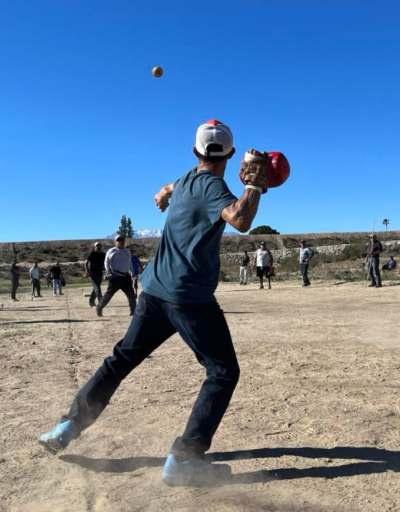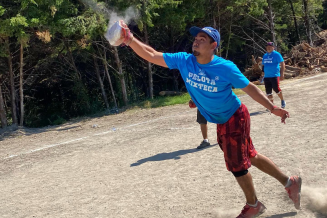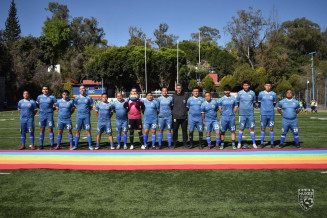When we are practising any discipline we invest time, effort, concentration, enthusiasm, and interest. In sports, the force that is put into practice collectively impacts the chemical and psychological processes of those who practice it and even other mechanisms for preserving cultures and identities. We barely glimpse the power of sport and to advance in this discovery it is urgent to address needs and problems so that more people have the confidence to practice it and testify to its transformative capacity, as is already happening in various parts of the world thanks to different community initiatives.
On the International Day of Sport for Development and Peace, which this year has the theme "Scoring for people and the planet", three persons tell UNESCO Mexico how it is possible that a field of 1,000 m2, gloves from three to six kilograms and rubber balls of almost half a kilo reappear from one country to another to reunite entire communities, and how allowing running for the ball with your hands up or playing like a girl strengthens mental health and the family, affective and collective ties.
The Pelota Mixteca game brings together and reunifies
Migrations have enriched cultural diversity through experiences and practices exchanged from different parts of the world over time, such as the case of the Pelota Mixteca (Mixtec ball) game. Rooted in Oaxaca, Mexico, from mountainous and even coastal areas, it has accompanied processes of people in mobility context to other cities in the country and abroad, being an element to handle adverse situations, an element of resilience for communities.
The traditional Mexican game becomes a motor for migrants, even in an irregular situation, to move to meet again, which has encouraged it to be practised more and more in cities like California or Texas, in the United States. Also in the interior of Mexico, as happened with the Arellanes family, with more than 20 years of history in Mexico City, since the father of Ángel Arellanes Ríos immigrated from Oaxaca. With four more brothers, the Mixtec ball team was complete.
On the other hand, sports competition can move from the idea of rivalry to that of solidarity. For example, Ángel Arellanes Ríos explains that the game is related to religious festivities and starts from the process of inviting opponents, which is considered a commitment to a dedicated rival, who are invited to eat and share before and after the game, along with other activities, rituals and ceremonies that may be managed by the host team and the community from which they come.

Mixtec ball has spread in the Mexican capital, mainly in Iztapalapa and in areas near the airport and Ajusco. However, it faces difficulties, not only having a wide and optimal space to practice it but also the need to foster interest among children through more planned strategies, broaden its recognition and even identify equipment alternatives, because traditionally the glove that the players use is practically artisanal, so it cannot be generated in series.
UNESCO recognizes that traditional games constitute an important part of cultural heritage and an effective instrument to promote intercultural dialogue. For this reason, meetings have been held with the National Commission for Physical Culture and Sports (CONADE) and the Mexican Federation of Autochthonous and Traditional Games and Sports to evaluate possible joint actions, such as escalating the dialogue on incorporating gender, intersectional and interdisciplinary perspectives in sports management, such as the 7th International Conference of Ministers and Senior Officials Responsible for Physical Education and Sport to be held at the end of June in Azerbaijan, to encourage sport to be part of the international agenda.
On the other hand, UNESCO promotes Media and Information Literacy, which encompasses not only the responsible use and consumption of data, information, media and digital content but also for its production, which must be made available to all citizens and incorporated into educational systems. For example, the Arellanes’ Team have had to resort to digital platforms to publicize the Mixtec ball game and preserve their cultural heritage.
Likewise, there is the commitment of those who practice sports to make its power and benefits known and take action to make it accessible to all people, thereby avoiding exclusionary or even discriminatory practices.
A football club that supports, includes and embraces
Belén and Humberto have had the so-called “pasión por el fútbol” (passion for soccer) since their childhood and they have been in different sports groups, but both agreed in separate interviews that the soccer Muxes Sports Club is the first where they feel fully included, being part of the free female category and free male category, respectively.
Humberto Ramírez Hernández comments that soccer is usually considered a rough and male sport, while Nancy Belén Zendejas Pérez says that prejudices persist such as considering that a girl does not play as well as a boy; imaginaries that have strengthened exclusion, reducing the possibilities for different people to participate in it.
Beto, as his teammates call him, mentions that his first contact with sports teams used to be very aloof, even in the semi-professional field and not only soccer, since he has also played basketball and volleyball. On other occasions, there was rejection against gay, bisexual, transgender men and non-binary people, which not only affects the technical development of athletes but also the psychosocial one.

While it is still being discussed in Mexico whether a shout should be allowed or prohibited, which among its meanings is associated with homosexuals and which is usually used in soccer matches to signal that a player did not fulfil the expectations of the audience, Beto comments that the fear of rejection, exclusion, and possible expulsion from soccer teams due to homophobia persists. "You take care of the way you run, shout, give orders because there is that fear of not shouting as they want, not running differently, which creates limitations."
Recognizing the needs of the sport beyond the technical issues allows the improvement of conditions for more people to practice it. For example, Belén's brother also experienced uncomfortable environments in his sports career, even though he is heterosexual, so he joined Club Muxes where he now plays in the third division. Belén joined then and discovered a space where respect prevails, accompaniment is provided and where the women have equity.
Belén shares that women commonly end up paying to play, although there are even women at the level of a second division in amateur groups. But scholarships or support are offered due to better performance in male categories. Even though she found in Muxes a space where soccer is prioritized with a genuine interest in female soccer, she believes that the general recognition of women in sports is not fulfilled because of the expectation of a masculine way of playing.

Belén and Beto agree that it is essential to promote respect for the differences from childhood and provide equal opportunities. Belén, who is trained as a sports science graduate, ratify the urgency of recognizing the psychological impacts of sport and that it can generate dynamics of peaceful coexistence and inclusion, benefiting family, friends and loved ones.
Alliances for knowledge and experience exchange are essential to achieve an inclusive sport and improve not only the practices that occur at the spot and at the time but also to promote public policies and programmes that allow transform conditions that make it accessible to all people and all people can feel confident to practice it.
Sport and physical activity play an essential role in individual physical and mental health, but also at a community level. However, more and better tools are needed to demonstrate and strengthen it systematically, mainly given the deep disparities that exist between countries and their internal realities, as well as the lack of investment now exacerbated by the COVID-19 pandemia, so UNESCO launched the global Fit for Life programme from its Social and Human Sciences Sector to help nations address these gaps through evidence and recap the experience of multiple groups around the world.














